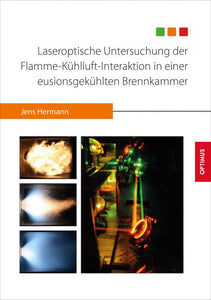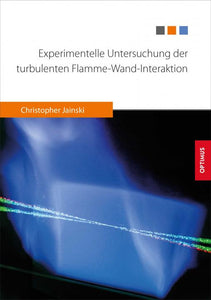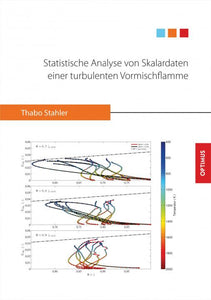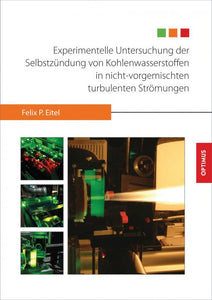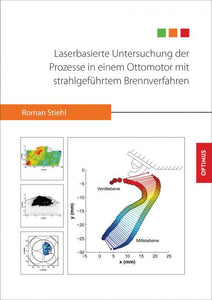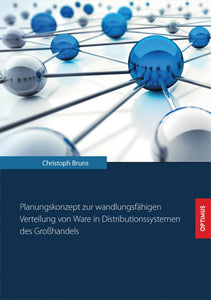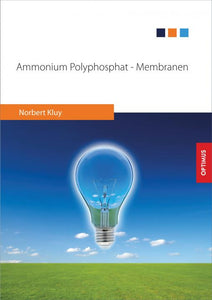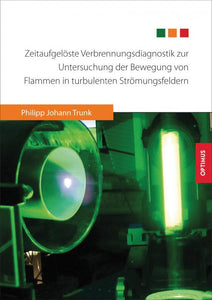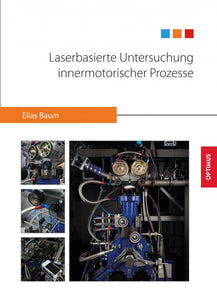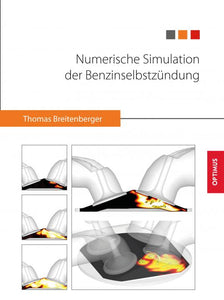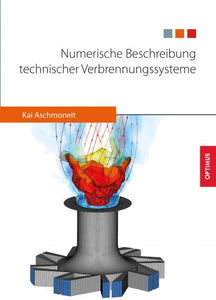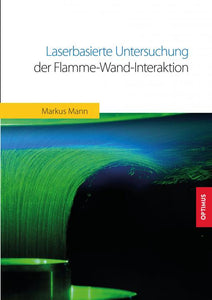
Mechanical engineering & process engineering
The combustion of hydrocarbons in a gas turbine will form the basis for aircraft propulsion for the foreseeable future. In order to minimize the environmental impact of this technology, novel combustion processes must be developed and loss processes within the gas turbine combustion chamber optimized. Current research areas relate to lean premixed combustion and the optimization of the cooling air requirement of the effusion-cooled combustion chamber wall. The aim of this work is to set up a gas turbine combustor...
€39,90
In many technical applications such as internal combustion engines or gas turbine combustion chambers, there is an interaction between the flame and the combustion chamber walls. In these areas, incomplete combustion with increased pollutant formation and reduced efficiency can occur due to a strong enthalpy withdrawal in the flame. A complete understanding of the flame-wall interaction (FWI) that takes place in this process is not yet available and is therefore the subject of current research. Within the scope of this...
€39,90
The subject of the work is the detailed statistical analysis of stratified and sheared flames. For this purpose, a generic, premixed, piloted burner is used, which enables stratification and shearing of the fuel-oxidizer mixtures that emerge through two independent annular gaps. To ensure that the processes that occur remain unaffected, laser-based methods are used to investigate them. The detailed characterization of the burner is carried out using thermographic phosphors to determine the wall temperatures. Combined Raman/Rayleigh spectroscopy is used for...
€39,90
Auto-ignition of hydrocarbons in turbulent flow environments plays a key role in many engineered combustion systems. The ignition in diesel or HCCI engines is specifically initiated by these complex processes and thus serves millions of individual locomotion. However, self-ignition processes also have unwanted phenomena, e.g. B. as knocking in gasoline engines is highly relevant. The subject of this thesis is the experimental investigation of the self-ignition of hydrocarbons in turbulent flows with the aim of describing these spatiotemporally highly dynamic...
€39,90
The automobile with a combustion engine forms a fundamental part of our transport system and will retain this importance in the years to come. The development of even more efficient engines is therefore an important field of research. In the field of gasoline engines, charge stratification by means of multiple injection offers particular potential for this. The aim of this work is to investigate the internal engine processes with a focus on identifying possible causes of cycle-to-cycle fluctuations. For this...
€39,90
Dynamic markets and changing framework conditions (e.g. shortened innovation and product life cycles), whose ever faster change is seen as a major challenge for logistics and thus for distribution and its planning, require a quick adjustment of the distribution of goods within a given distribution structure. The core of this work is a planning concept for the versatile distribution of goods in wholesale distribution systems, which, taking into account the constantly changing influencing factors, enables control and monitoring of the...
€59,90
Fuel cells are a promise for the future thanks to modern technology and still great potential for improvement. At this point, this work begins and develops a new class of materials with regard to their use in fuel cells. The resulting composite is in the form of a thin and flexible membrane and is described in terms of its construction. The description explains the material properties and finds the optimal parameters for using the membranes as an electrolyte in a...
€39,90
In technical combustion processes, the interaction of the flame with the turbulent flow field plays a crucial role in the stability, safety and efficiency of energy conversion. Turbulent combustion is a three-dimensional multiscale phenomenon. In the operation of technical burners, transient combustion states such as spark and self-ignition, flame extinction and flashback can also occur. To investigate these phenomena, imaging laser-optical measurement methods are developed in this work and simultaneously applied to the measurement of transient flames in a turbulent...
€39,90
The energy conversion in combustion engines plays an important role both for the flow of goods and for individual transport. From the point of view of the scarcity of raw materials and the constant growth in population, a detailed understanding of the physical relationships is necessary in order to be able to carry out this conversion process with optimal efficiency and thus efficient use of resources. The aim of this work is to gain a deeper understanding of the internal...
€39,90
The subject of this thesis is the development of a method for the numerical simulation of gasoline self-ignition. In addition to the calculation of non-reacting flows with moving and stationary computational grids, a piloted methane-air jet flame is simulated. In addition, the work gives an outlook on the treatment of a near-production single-cylinder 4-stroke gasoline engine with direct injection in compression-ignition mode. The developed numerical method is based on a time-resolved, three-dimensional description of the gas and the disperse phase...
€39,90
Engines, aircraft engines or gas turbines are just a few examples of technical combustion systems. The energy chemically bound in the fuel is converted into other forms of energy with the help of a combustion process. Combustion control is crucial to develop efficient and low-emission systems. As a prediction tool, computer simulation is already making a major contribution that will continue to grow in the future. The simultaneous further development of turbulence and combustion models is crucial in order to...
€34,90
The interaction of flames and combustion chamber walls occurs in almost all common technical combustion systems. Incomplete combustion leads to an increased formation of pollutants in the area close to the wall. Current developments to increase the efficiency of internal combustion engines and aircraft engines are often based on reducing combustion chambers while maintaining or increasing performance. The more compact combustion chambers increase the surface-to-volume ratio, so that the flame-wall interaction will become more important in future combustion system developments....
€39,90

